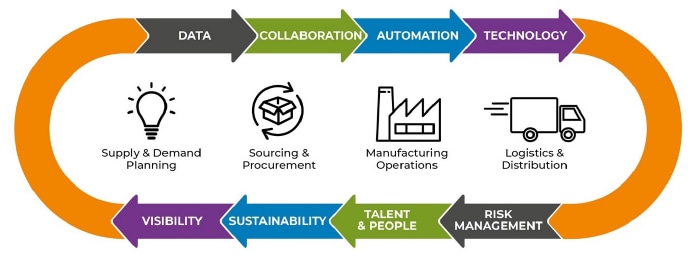The field of supply chain management has rapidly evolved over the years, with advancements in technology being the main focus for a lot of these changes. As a student in this field, I am constantly seeking out new information and insights to stay informed on the latest trends and developments. Recently, I came across a podcast episode titled “Delivering APEX – One Byte At A Time” which I found particularly informative. The podcast featured Amanda Nazareno, an expert in supply chain management who works at Apex, a company specializing in logistics and supply chain solutions. Throughout the podcast, Amanda shared her insights on the role of technology in the supply chain industry and how companies can leverage it to stay ahead of the curve. In my article, I wish to assess these thoughts from the perspective as a student entering the supply chain management field.
Innovation Through Technological Advancements
My first key takeaway from the podcast was the importance of innovation in the supply chain industry. According to Amanda, there has been a significant volume of investment in innovation across all areas of the supply chain, which has consequently helped to drive the industry forward. As someone who is interested in pursuing a career in supply chain management, I found this particularly encouraging, as it suggests that there will be plenty of opportunities for growth and advancement in the field. Amanda states that the COVID-19 pandemic was one of these events that had a huge impact on the supply chain industry. She notes that the pandemic had forced companies to break down “functional silos” and instead build “interconnected people, data, and processes”, all of which is enabled by an advance in technology. This is an important point to consider, as it highlights the need for companies to be flexible and adaptable in the face of unexpected challenges. I see this as valuable information that I can apply to my own studies and future career. I have a strong belief that technology will not plateau, but rather find a way to become more and more innovative as time goes on. It will be the jobs of leaders in each field to recognize this change and take advantage of it.
“There’s a constant chase for radical and revolutionary solutions.”
-Amanda Nazareno
Data and Collaboration
As a supply chain management major, I found Amanda’s insights on the importance of data in the industry to be spot on. I have learned firsthand the power of data in making more informed decisions and identifying areas for improvement. It was interesting to hear Amanda emphasize the crucial role that data plays in gaining greater visibility and control over supply chain operations. The ability to use data to make informed decisions is one of the key advantages that supply chain professionals have over their competitors, and I believe it will only become more important as the industry continues to evolve.
Amanda also touched on how data is enabling more agility due to the fast-paced and ever-changing supply chain environment. With the rise of e-commerce and the increasing importance of speed and efficiency, I believe having a transparent supply chain is a must-have for any company looking to stay ahead of the curve. Amanda’s emphasis on collaboration and customers served to be pretty insightful. She states that advancements in technology have allowed for feedback communication from customers to be gained in a much easier way compared to the past. However, I think this does not just apply to consumers. I say collaboration is essential between companies as well since no company can operate in isolation. By working together and sharing data, companies can build a more responsive supply chain. At the same time, they can keep the customer at the center of all decision-making that is critical to success. By using technology to prioritize customer needs, companies can predict future problems and remain ahead of the competition.

The basic cycle of the supply chain industry. (Source)
Mitigating Risk
Finally, I found Amanda’s points about the importance of predictability in the supply chain industry very unique. Her emphasis on the need for radical and revolutionary solutions to improve predictability matched my idea of the need for growth in a rapidly evolving nature of the industry. I liked how the podcast included many insights on how businesses can take control and mitigate risk in the supply chain process. One idea I found interesting included having a business execute risk treatment programs, or the creation of solutions for potential problems. Using resources to combat future problems early was something that I had not thought about while studying supply chain. Therefore, it was interesting to hear about the various solutions businesses can offer to manage their operations more effectively. Also, it highlighted the importance of leveraging technology to improve visibility, optimize processes, and reduce costs. Overall, Amanda’s reflections on these topics shed light on the complexities of the supply chain industry and how technology can help solve problems never even thought of before.
From my perspective as a student just entering the field, the podcast provided a valuable opportunity to learn from an industry expert and gain new insights into the latest trends and developments. I believe that this is a resource that would be of interest to anyone interested in pursuing a career in supply chain management, as well as to professionals who are already working in the industry. Therefore, I would highly recommend this podcast to anyone who is interested in learning more about technology in the supply chain industry.